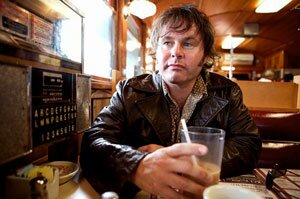INTERVIEW- Good failures: Sexton's growth-inspiring setbacks

Publicity photo
At first, Martin Sexton's claim that he meant to pay homage to Looney Tunes voice artist Mel Blanc with his latest album seems as absurd as it is unlikely. After hearing his latest album, however, it's hard to argue. Right Where You Belong wobbles like a drinking song without the grandeur imparted by a table of enthusiastic winos, and Sexton sways right along as though he has no idea he's in the national spotlight.
His quirkiness knows no bounds; elsewhere, "Failure" is four minutes of a grateful Sexton thanking his lucky stars that he sucked at all the things he tried before arriving at music. He may still pop out the occasional tender ballad, but it's clear that after 15 years as an indie songwriter, Sexton has learned that music doesn't always have to take itself so seriously.
The Hook: In the past you've performed with a band, as part of a duo, and as a soloist. Which one is it on this tour?
Martin Sexton: A duo configuration, with my old friend Joe Bonadio playing drums. This is kind of a reunion tour for us. I did this whole-band run through the spring and summer, and then this fall has been all me solo and duo.
The Hook: Do the songs feel drastically different in each incarnation? Do you have to reinvent them?
Martin Sexton: Yeah, I do actually. I got sort of used to playing the tunes with a band this spring. It was a little bit like being a fish out of water when I was first getting back together with Joe, but it only took about an hour, and it was basically like riding a bike. But, yes, it was a slight reinvention of the tunes.
The Hook: What changed, specifically?
Martin Sexton: When I had the band working, they were covering the bass and the drums and the organ and all that, so I had to rise to the challenge of covering those areas myself. I'll tend to thump the bass
with my thumb while I'm playing the chords with my finger. It actually creates a whole different vibe on the tune. The crowd tends to groove on it a little more, because they get included in it– they start clapping their hands and stomping their feet to the rhythm and take on this feeling of participation. When people participate, it takes on this whole new strength and beauty and size. It goes from two guys on stage to a thousand people putting on a show for themselves.
The Hook: Do you try to capitalize on that? What do you do to really bring it out?
Martin Sexton: Oh, I do. I'm always encouraging them. It doesn't take much for them to sing a three-part harmony.
The Hook: So what's the best audience participation you can remember?
Martin Sexton: Of this run so far, people in Calgary, Alberta– about a thousand Canadians in this nice old theater– just sang like they were in the same gospel choir. No one sang too loud; it was perfectly blended in three parts. It was just amazing. I asked them to come on the road with me, but we couldn't fit them on the bus.
The Hook: You were a busker for years. How does that turn up in what you do now?
Martin Sexton: My years as a street singer were like my university for performance, and I still utilize the techniques that I honed back then– the whole "call and response" thing, the way I write a set list–
you try to grab them first and hold them and keep them wanting more. I like to have a show be just long enough that they get enough but want a little more. I try to pay attention to that old-school show-business rule: leave them wanting more, but leave them feeling like they really got their money's worth.
The Hook: Which is harder, busking locally or touring nationally?
Martin Sexton: I would say the latter. There's just so much more going on. It's a lot more rewarding now as I sit on a nice tour bus outside a beautiful gig, but there are challenges and stresses, like any job. It was fairly easy getting up at 7am and getting out to the subway station and catching that morning commute crowd. That was fairly simple. Now it's just a whole different ball of wax. I own my own label, and I run my own ship. The good news is that I would have killed 10 years ago to have the problems I have today. I have luxury problems today.
The Hook: Like what?
Martin Sexton: There was a show on this run where the promoter dropped the ball, and all his light rigging didn't show up to the gig, so we had to do it with one light shining on me. But it was a thousand people. I would have killed to have that problem 10 years ago. I'm actually grateful for most of the problems I run into these days.
The Hook: That seems to parallel the sentiment in "Failure." Are you actually that Sesame Street in your approach?
Martin Sexton: I don't know, I'm realistic. Happiness comes as a byproduct of good living and going in the right direction. I feel like we've been doing that here on the road and in the studio. But yeah, most of the best things in my life wouldn't be here if it weren't for past failures. If I had it my way, I'd be selling real estate up in Syracuse, New York. I'm just thankful that I don't always get my way.
Martin would like you to go to the Satellite Ballroom on Friday, but if you don't, he'll probably understand and will attempt to see the silver lining. $20-$22, 9pm.
#